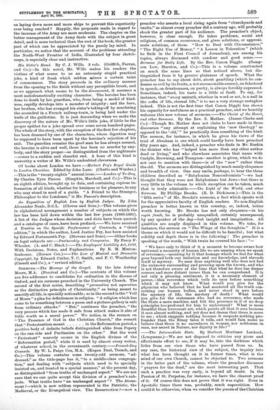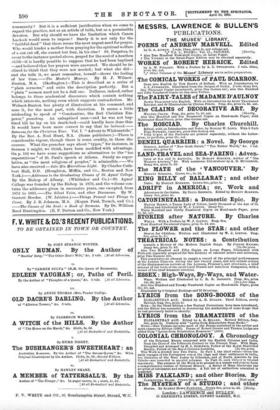Suszeoxs. — The Message of the Gospel. By the late Aubrey Moore,
M.A. (Percival and Co.)—The contents of this volume are five addresses to candidates for ordination in the diocese of Oxford, and six sermons preached in the University Church. The second of the first series, describing "permeation not separation as the distinctive principle of Christianity," as being meant to sanctify all life, is specially noticeable; so in the second is the " Veil of Moses " a plea for definiteness in religion. " A religion which has come to be something between a poem and a picture-gallery is safe from ordinary attacks." " But continues the preacher, " the very process which has made it safe from attack makes it also of
little worth as a moral power." We notice, in the sermon on " The Presence of God in the Christian Church," the remark that " Protestantism meant in the Reformation period, a positive body of definite beliefs distinguished alike from Popery on the one side and Puritanism on the other." But the word " Protestant" scarcely occurs in the English divines of the " Reformation period," while it is used by almost every writer,
of whatever school, in the seventeenth century.—Present-Day Counsels. By W. L. Paige Cox, M.A. (Kagan Paul, Trench, and
Co.)--This volume contains some twenty-odd sermons, "ad- dressed," as the title-page has it, "to a middle-class congrega- tion," and dealing with "subjects which need to be specially insisted on, and treated in a special manner," at the present day, as distinguished "from truths of unchanged aspect." We are not sure that we can quite accept this division of a preacher's sub-
jects. What truths have " an unchanged aspect " ? The Atone- ment ?—which is now seldom represented in the Patristic, the Medireval, or the Evangelical view. The Resurrection ?—now preacher who asserts a local rising again from " churchyards and vaults," as almost every preacher did a century ago, will probably shock the greater part of his audience. The preacher's object, however, is clear enough. He takes problems, social and religious, of common occurrence, and gives solutions, or approxi- mate solutions, of them. "How to Deal with Circumstance," "The Right Use of Money," "A Lesson in Toleration" (which he finds in the First Council of Jerusalem), are among his topics, always discussed with candour and good sense.— Sermons for Daily Life. By the Rev. Canon Diggle. (Samp- son Low, Marston, and Co.)—This is a volume constructed on much the same lines as that noticed above, but dis- tinguished from it by greater plainness of speech. What the preacher has to say about debt, about gambling (which he con- demns as evil by its fruits, a not unreasonable course), on falsehood in speech, on drunkenness, on purity, is always forcibly expressed. Sometimes, indeed, his taste is a little at fault. To say, for instance, that "every untruth, whether in word or act, is a nail in the coffin of life, eternal life," is to use a very strange metaphor indeed. This is not the first time that Canon Diggle has shown his capacity for usefulness as a practical preacher, and we heartily welcome this new volume of sermons.—The Christ of the Heart, and other Sermons. By the Rev. Z. Mather. (James Clarke and Co.)—Though Mr. Mather does not claim to have made in these discourses "any attempt at explaining the 'new theology' as opposed to the ' old," he practically does something of the kind. The sermon, for instance, in which he gives his views of the trial of Abraham is one which could hardly have been preached fifty years ago. And, indeed, a preacher who finds in Mr. Ruskin the thinker who has " helped him more than any other author dead or living," and who elsewhere associates that name with Carlyle, Browning, and Tennyson—another is given, which we do not care to mention with these—is of the " new" rather than the old. The sermons are distinguished by mach manly eloquence and breadth of view. One may smile, perhaps, to hear the three children described as " Babylonian Nonconformists "—we had thought that they were not Babylonians but Jews—but there is very little in the volume to which exception can be taken, much that is truly admirable.—The Light of the World, and other Sermons. By Phillips Brooks. (R. D. Dickinson.)—This is the "fifth series" of Mr. Brooks's sermons, a fact which speaks well for the appreciative faculty of English readers. No non-English preacher is better known in this country, or, indeed, better worth knowing. Mr. Brooks has not only eloquence—in his copies fandi, he is probably unequalled, certainly unsurpassed, by any speaker of the day—but insight and imagination. All qualities are amply displayed in this volume. We take, for instance, the sermon on "The Wings of the Seraphim." It is a theme on which it would not be difficult to be fanciful; but what solidity and depth there is in the following ! The preacher is speaking of the words, " With twain he covered his face : "-
" We have only to think of it a moment to become aware how universal a necessity of human life we are naming when we speak of reverence,—meaning by it that homage which we feel for what goes beyond both our imitation and our knowledge, and shrouds itself in mystery. No man does anything well who does not feel the unknown surrounding and pressing upon the known, and who is not therefore aware at the time that what he does has deeper sources and more distant issues than he can comprehend. It is not only a pleasing sentiment, it is a necessary element of power,—this reverence which veils its eyes before something which it may not know. What would you give for the physician who believed that he had mastered all the truth con- cerning our human bodies, and never stood in awe before the mystery of life, the mystery of death ? What would you give for the statesman who had no reverence, who made the State a mere machine, and felt the presence in it of no deep Frinciples too profound for him to understand ? What is more dreadful than irreverent art, which paints all that it sees because it sees almost nothing, and yet does not dream that there is more to see ; which suggests nothing because it suspects nothing pro- founder than the flimsy tales it tells, and would fain make us believe that there is no sacredness in woman, nor nobleness in man, nor secret in Nature, nor dignity in life ?"
—The Intermediate State. By Herbert Mortimer Luckock. (Longmans.)—We are not disposed to criticise any pious and affectionate effort to see, if it may be, into the darkness which hides from our view those who have passed from us. In any case, the historical view of the subject, the inquiry into what has been thought on it in former times, what is the mind of our own Church, cannot be objected to. Two sermons in the latter part of the volume, where the preacher discusses " prayers for the dead," are the most interesting part. That such a practice was very early, is beyond all doubt. In the Passion of St. Perpetua, for instance, we have the clearest proof of it. Of course this does not prove that it was right. Even in Apostolic times there was, probably, much superstition. How could it be otherwise, when we consider the genesis of the Christian community ? But it is a sufficient justification when we come to regard the practice, not as an article of faith, but as a permissible devotion. But why should we have the limitation which Canon Luckock would seem to impose ? Surely it is not only for the " faithful dead " that there seems the most urgent need for prayer. Who would hinder a mother from praying for the spiritual welfare of a son cut off, she cannot but fear, in his sins ? St. Perpetua, to recur to the instance quoted above, prayed for the soul of a heathen child-it is hardly possible to suppose that he had been baptised -and believed that her prayers were answered. We should be in- clined to think that they were not needed ; but what she did- and she tells it, we must remember, herself-shows the feeling of her time.-The Master's Message. By H. J. Wilmot- Buxton, M.A. (Skeffington.)-This is described as a series of "plain sermons," and suits the description perfectly. But a " plain " sermon need not be a dull one. Dullness, indeed, rather belongs to those academical discourses which contain nothing which interests, nothing even which suggests contradiction. Mr. Welmot-Buxton has plenty of illustration at his command, and uses it, for the most part, with discretion. It seems a little misleading to speak of " Constantine, the first Christian Em- peror," preaching. An unbaptised man-and he was not bap- tised till he lay on his death-bed-could hardly have done this. It would have been more correct to say that he lectured.
Sermons for the Christian Year. Vol. I. " Advent to Whitsuntide." By the Rev. A. Noel Hunt, B.A. (Same publishers.)-There is considerable vigour, though there is some crudity, in these dis- courses. What the preacher says about "types," for instance, in Sermon 5 might, we think, have been modified with advantage. On p. 102 we have some suggestions as alternatives to the "too superstitious" of St. Paul's speech at Athens. Surely no super- lative, as "the most religious of peoples," is admissible.-We have also received :-Into His Marvellous Light. By Charles Cuth- bert Hall, D.D. (Houghton, Mifflin, and Co., Boston and New York.)-Addresses to the Graduating Classes of St. Agnes' College. By the Bishop of Albany. (Whittaker and Co.)-St. Agnes' College was founded by the Bishop in 1870, and the volume con- tains the addresses given in successive years, one excepted, from 1872 to 1891.-The Silent Voice, and other Discourses. By W. Garrett Horder. (W. Isbister.)-Things Present and Things to Come. By J. B. Johnson, M.A. (Regan Paul, Trench, and Co.) -The Causes of the Soul : a Book of Sermons. By Dr. William Reed Huntingdon. (E. P. Dutton and Co., New York.)



















































 Previous page
Previous page